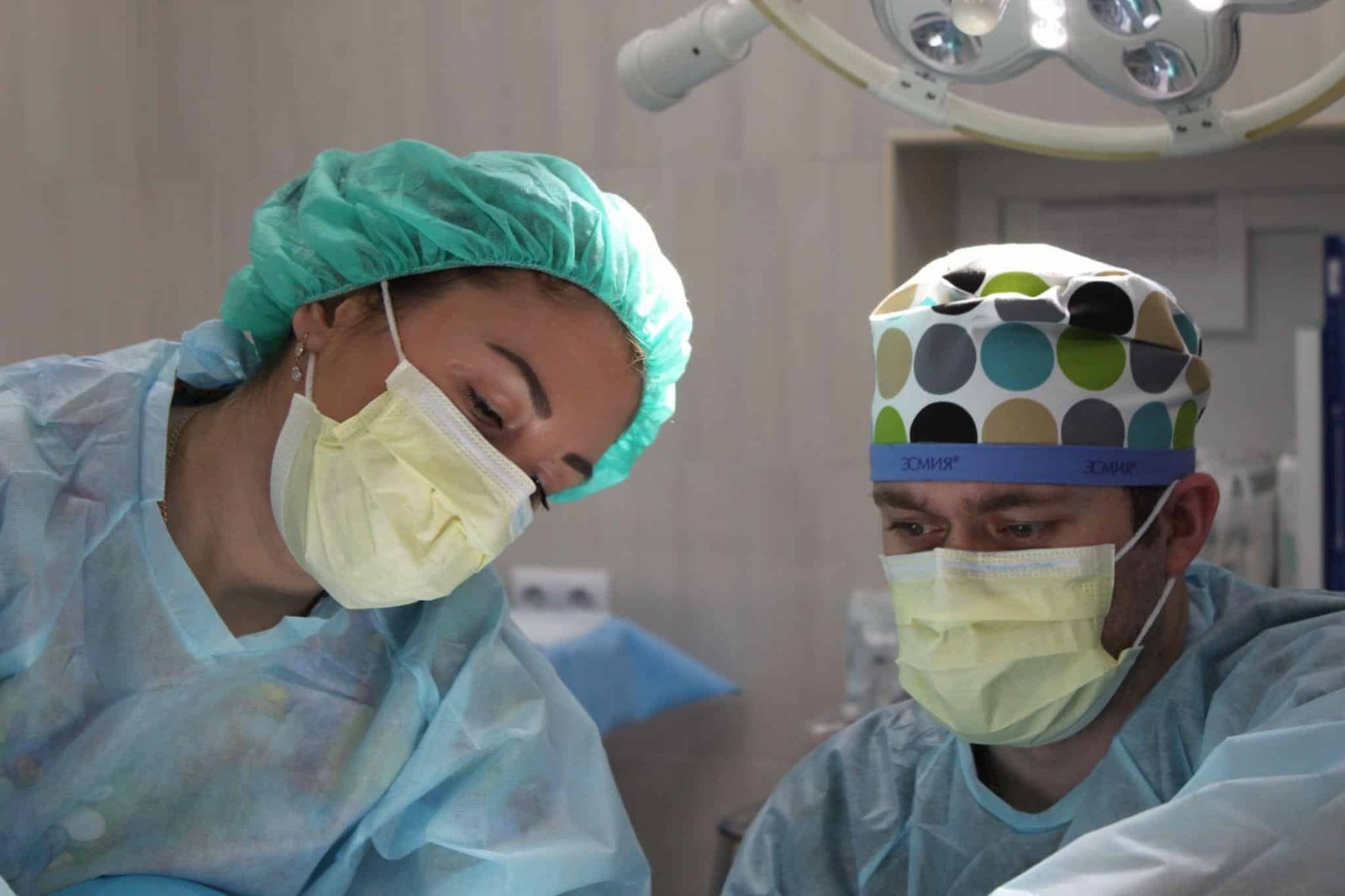5 In-Demand Healthcare Jobs in Canada and How to Qualify for Them

Hey there, healthcare heroes! Are you looking to take your career to the next level? Well, you’re in luck because we’ve got the inside scoop on five in-demand healthcare jobs in Canada waiting for someone like you to step up and take charge.
Whether you’re a seasoned professional or just starting, there’s a role out there that will suit your skills and qualifications. So, buckle up and get ready to learn about the opportunities that are waiting for you in the Canadian healthcare industry. It’s time to make your mark and help make a difference in people’s lives!
5 In-Demand Healthcare Jobs in Canada in 2023

As of 2023, here are five of the most in-demand healthcare jobs in Canada:
Registered Nurse: With an aging population and a growing demand for healthcare services, registered nurses are in high demand nationwide. RNs provide critical patient care in various settings, from hospitals to clinics to home care.
Medical Laboratory Technologist: Medical laboratory technologists play a key role in the healthcare system by performing and analyzing diagnostic tests that help doctors diagnose and treat their patients. With advances in technology and an increase in the number of medical tests being performed, there is a growing need for skilled medical laboratory technologists.
Physician Assistant: Physician assistants work under the supervision of physicians to provide patient care in various settings. They can diagnose and treat patients, prescribe medication, and perform minor procedures. As the demand for healthcare services grows, the need for physician assistants is expected to increase.
Pharmacist: Pharmacists play a vital role in the healthcare system by ensuring patients receive the proper medications and doses to treat their conditions. With an aging population and increased chronic diseases, the demand for pharmacists should grow in the coming years.
Occupational Therapist: Occupational therapists help patients recover from injuries or illnesses and regain the skills they need to perform daily activities. They work with patients of all ages and in various settings, including hospitals, clinics, and long-term care facilities. As the population ages and chronic conditions become more common, the need for occupational therapists is expected to increase.
See also: 8 Cool Scholarships and Grants for Nurse Practitioners.
Educational Requirements

Here’s an outline of the educational requirements for each of the five in-demand healthcare jobs in Canada:
Registered Nurse:
A Bachelor of Science in Nursing (BSN) degree or a diploma in nursing from a recognized college or university.
Completing the National Council Licensure Examination (NCLEX-RN) to become a licensed registered nurse.
Medical Laboratory Technologist:
A Bachelor’s degree in medical laboratory science or a related field from an accredited institution.
Certification from the Canadian Society for Medical Laboratory Science (CSMLS) or the equivalent provincial regulatory body.
Physician Assistant:
A Master’s degree in Physician Assistant Studies from a recognized university.
Completing the Physician Assistant National Certification Exam (PANCE) to become a certified physician assistant.
Pharmacist:
A Bachelor’s degree in Pharmacy or a Doctor of Pharmacy (PharmD) degree from an accredited institution.
Completion of the Pharmacy Examining Board of Canada (PEBC) Qualifying Exam and licensure by the provincial regulatory body.
Occupational Therapist:
A Master’s degree in Occupational Therapy from an accredited institution.
Certification from the Canadian Association of Occupational Therapists (CAOT) or the equivalent provincial regulatory body.
These are general education requirements and may vary by province or employer. Some may require additional certifications or experience depending on the specific job requirements.
Skills and Experience

Some key skills and experience required for success in each of the five in-demand healthcare jobs in Canada, as well as some examples of how they can be acquired:
Registered Nurse:
Strong communication and interpersonal skills to effectively communicate with patients, families, and other healthcare professionals.
Ability to work in a fast-paced environment and handle multiple tasks simultaneously.
Clinical skills such as medication administration, wound care, and IV therapy.
Experience can be acquired through clinical placements during nursing education programs, volunteer work in healthcare settings, and on-the-job training.
Medical Laboratory Technologist:
Strong attention to detail and analytical skills to perform and analyze diagnostic tests accurately.
Knowledge of laboratory safety and infection control practices.
Ability to work independently and as part of a team.
Experience can be acquired through clinical placements during medical laboratory science education programs, on-the-job training, and continuing education courses.
Physician Assistant:
Strong critical thinking and problem-solving skills to diagnose accurately and develop treatment plans.
Knowledge of pharmacology and the ability to prescribe medication.
Excellent communication and interpersonal skills to effectively communicate with patients and healthcare professionals.
Experience can be acquired through clinical placements during Physician Assistant education programs, on-the-job training, and continuing education courses.
Pharmacist:
Strong knowledge of pharmacology and medication management.
Excellent communication and interpersonal skills to effectively communicate with patients and healthcare professionals.
Attention to detail and the ability to work independently.
Experience can be acquired through clinical placements during Pharmacy education programs, internships, and on-the-job training.
Occupational Therapist:
Strong communication and interpersonal skills to effectively communicate with patients and healthcare professionals.
Knowledge of anatomy and physiology and the ability to develop treatment plans that address patients’ physical, cognitive, and emotional needs.
Ability to work independently and as part of a team.
Experience can be acquired through clinical placements during Occupational Therapy education programs, volunteer work in healthcare settings, and on-the-job training.
It’s important to note that these skills and experiences are not comprehensive and may vary depending on the job and employer. However, these skills and experiences can be acquired through education, training, and on-the-job experience.
See also: Top Guide on Jobs in Perth, Australia, in 2023
Job Outlook

Here’s a discussion of the job outlook for each of the five healthcare jobs, including projected growth rates, salary expectations, and other relevant factors:
Registered Nurse:
Projected job growth: Between 2022 and 2031, the available registered nursing job is projected to be about 155,000 against 143,000 registered nurses.
Salary expectations: According to Talent.com, the median annual salary for registered nurses is $72,935.
Other relevant factors: As the Canadian population ages, the demand for registered nurses is expected to increase. Additionally, there is a shortage of nurses in some regions of the country, leading to increased job opportunities in those areas.
Medical Laboratory Technologist:
Projected job growth: 7% from 2021 to 2031 (according to the U.S. Bureau of Labour Statistics).
Salary expectations: According to Jobillico, the median annual salary for medical laboratory technologists is $54,080.
Other relevant factors: As the demand for medical tests and procedures increases, the need for medical laboratory technologists is also expected to increase. Additionally, there currently needs to be more medical laboratory technologists in some regions of the country, leading to increased job opportunities in those areas.
Physician Assistant:
Projected job growth: According to JobBank, there’s currently a shortage of physician assistant in the country. And this is likely to continue until the year 2031
Salary expectations: According to GlassDoor, the median annual salary for physician assistants is $89,605.
Other relevant factors: Physician assistants are a relatively new profession in Canada. Still, demand for their services is expected to increase as the population ages and the demand for healthcare services grows. Additionally, physician assistants can help alleviate some of the strain on the healthcare system by providing timely and efficient care.
Pharmacist:
According to JobBank, there will be another 16,100 new jobs between 2022 – 2031. And there will be around 20,000 people to fill those spaces.
Salary expectations: According to PhartmaTax, the median annual salary for pharmacists is $99,749.
Other relevant factors: As the population ages and chronic diseases become more prevalent, the demand for pharmacists is expected to grow. Additionally, pharmacists are increasingly taking on a more prominent role in patient care, which could lead to increased job opportunities.
Occupational Therapist:
Projected job growth: According to JobBank, there should be around 9,100 new jobs between 2022 – 2031, and there will be around 7,600 persons to fill these positions.
Salary expectations: According to PayScale, the median annual salary for occupational therapists is $73,000.
Other relevant factors: As the population ages and chronic conditions become more common, the demand for occupational therapists is expected to increase. Additionally, occupational therapy is increasingly being recognized as an important part of the healthcare system, which could lead to increased job opportunities.
It’s important to note that these projections and salary expectations are not definitive and may vary depending on the job and location. However, these factors can provide a general idea of what to expect regarding job prospects and compensation for each of Canada’s five in-demand healthcare jobs.
See also: Top in-demand jobs in Canada in 2023
Career Paths

Potential career paths for each of the five healthcare jobs in Canada, including opportunities for advancement or specialization within the field:
Registered Nurse:
Registered nurses can pursue various career paths, including clinical roles in hospitals, community health centers, and long-term care facilities. They can also move into administrative positions like nurse managers or executives. Specializing in emergency care, pediatrics, critical care, and oncology are opportunities. Registered nurses can also pursue advanced education, such as a master’s or doctoral degree, to become nurse practitioners, clinical nurse specialists, or nurse educators.
Medical Laboratory Technologist:
Medical laboratory technologists can advance to become laboratory managers, quality assurance specialists, or education coordinators. They can also specialize in microbiology, hematology, immunology, and clinical chemistry. Medical laboratory technologists can also pursue advanced education, such as a master’s degree, to become laboratory directors or researchers.
Physician Assistant:
Physician assistants can advance to become clinical coordinators, department heads, or educators. They can also specialize in emergency medicine, surgery, oncology, or psychiatry. Physician assistants can also pursue advanced education, such as a master’s degree or doctorate, to become physician assistant researchers or educators.
Pharmacist:
Pharmacists can pursue various career paths, including clinical roles in hospitals, community pharmacies, and long-term care facilities. They can also move into administrative positions like pharmacy managers or directors. Pharmacists can specialize in oncology, infectious diseases, pediatrics, or geriatrics. Pharmacists can also pursue advanced education, such as a master’s or doctoral degree, to become pharmacy researchers or educators.
Occupational Therapist:
Occupational therapists can advance to clinical coordinators, education coordinators, or department heads. They can also specialize in hand therapy, pediatrics, neurology, or geriatrics. Occupational therapists can also pursue advanced education, such as a master’s or doctoral degree, to become occupational therapy researchers or educators.
Final thoughts on the importance of these in-demand healthcare jobs in Canada
In conclusion, the importance of in-demand healthcare jobs in Canada cannot be overstated. They provide essential services necessary for the health and well-being of individuals and communities.
These jobs offer fulfilling career opportunities that allow individuals to make a positive impact on the lives of others. As the demand for healthcare services continues to increase, the need for skilled healthcare professionals will only grow, making these careers an excellent choice for those seeking job security and meaningful employment.




